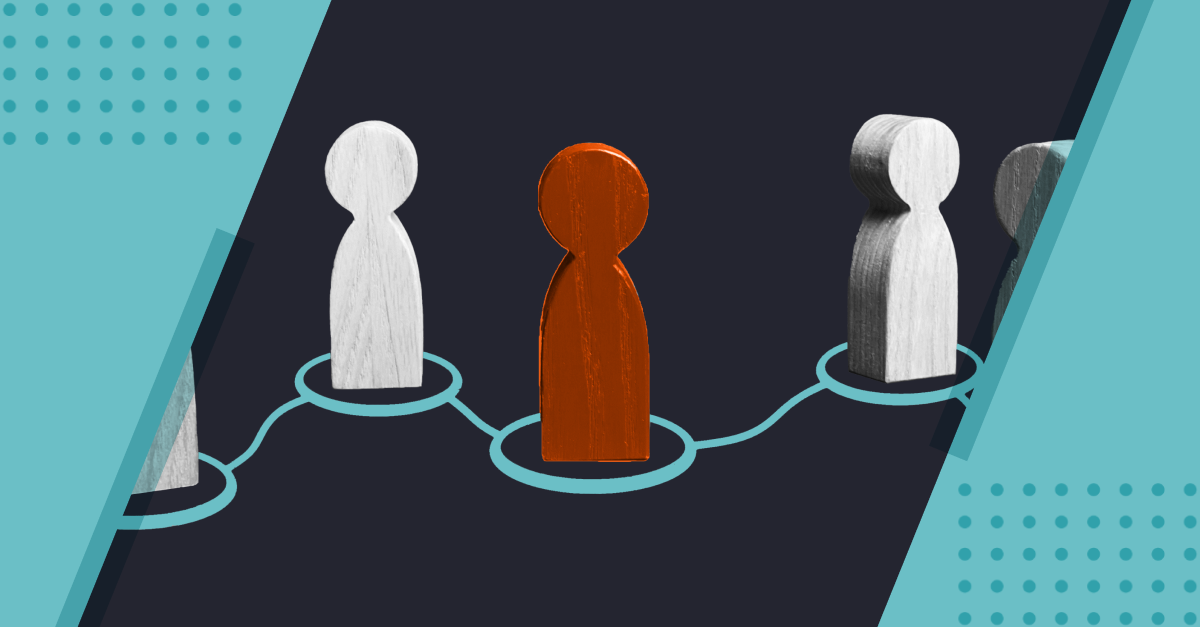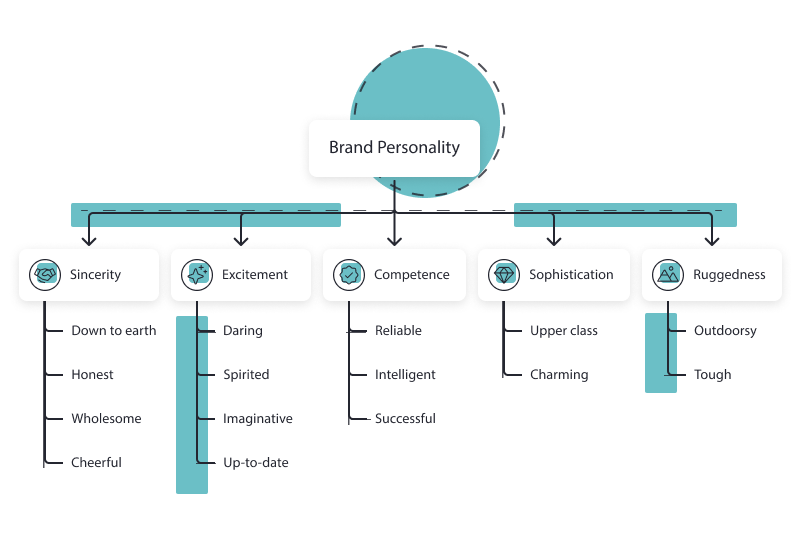
How would you describe your manufacturing business as a person? Here's a hint: 'competitively priced and strategically located with world-class facilities' are not personality traits.
If your company was a person - how would you describe them?
Many manufacturing brands faced with this challenge struggle to think of any humanising adjectives that could apply to their business.
Some can't even see the relevance of the exercise.
And that's a problem.
Because humanising your B2B brand is the key to building the connections that can turn your relationship with prospects and customers from the transactional into something much more enduring and profitable.
Here's why.
Why brand personality matters
Would you go on a dinner date with someone you didn't trust? Or how about someone you didn't like? In your personal life you wouldn't waste your time pursuing someone you didn't have some form of connection with.
And the same can be true of the brands we deal with in our working lives, too. If we're going to make a big purchase on behalf of our company, whether it's software or manufacturing services, we want to see the 'whites of their eyes' first. We need to feel the company is trustworthy and reliable before we take the plunge and do business with them.
In other words, we need to feel a connection with the brand on a human level.
But in a B2B world where nearly 60% of buyer decision-making is done without ever talking to a human being, creating this connection is harder than ever.
Why be human?
By building a brand personality - creating a sense of a human face behind a 2D corporate mask, industrial companies are more likely to engage with and win the attention, trust and long-term business of their prospects and customers.
But can brands have personalities?
The researcher, Jennifer Aaker, thinks so. She has identified 5 key, human-like characteristics that consumers find compelling in the brands they engage with. Through all her research, she concluded that these are the brand personality traits that predominantly drive loyalty and engagement between companies and their customers.
 Not every brand personality type will be valued by your specific customer or be relevant to your brand. But the ones that are, can be used by your team to shape your marketing voice. They offer powerful ways to differentiate, communicate and cut through to an intended audience.
Not every brand personality type will be valued by your specific customer or be relevant to your brand. But the ones that are, can be used by your team to shape your marketing voice. They offer powerful ways to differentiate, communicate and cut through to an intended audience.
How can brands be human?
B2C brands famously use brand personality to differentiate themselves in ways that heighten their appeal to certain segments. Let's use the example of the fiercely competitive market for tea drinkers in the UK.
Just look at the packaging of different tea bag brands on supermarket shelves or watch their TV commercials, and you'll see different ‘characters’ emerge, appealing to very different demographics.
Most share a central trait of reliability and competence (after all, we need to be sure the company is going to be capable of making a decent cuppa) - but they differentiate by personality in very different ways:
|
Product |
Brand Personality Dimensions |
Personality Traits |
|
PG Tips |
Competent - Sincere |
Reliable, traditional, approachable, comforting |
|
Twinings |
Competent - Exciting - Sophisticated |
Reliable, innovating, intelligent, elegant |
Sending messages like these, it's easy to see how certain types of buyer can be drawn to certain types of consumer brands over others.
What about a B2B industrial brand?
But what kind of human characteristics could a manufacturing company usefully claim to enhance their customer relationships?
Research into industrial companies suggests that their brand personalities need to centre around competence and reliability. Customers investing in precision engineering products obviously need to feel their suppliers are the best at what they do and take pride in quality.
But sincerity, excitement, sophistication and ruggedness might figure as personality traits that bring different dimensions to the way a brand is seen. And they could all increase their perceived value in the marketplace.
For example, being seen as pioneering, innovative and even 'outdoorsy' could be important for those working on big mechatronic and plant projects.
Here’s a couple of famous industrial brands and their self-confessed brand personalities:
|
Product |
Brand Personality Dimensions |
Personality Traits |
|
Caterpillar |
Competent - Rugged - Exciting |
Hardworking, Determined, Bold |
|
John Deere |
Competent - Rugged - Sincere |
Smart, Real, Down to Earth Doing valuable work |
These brand personalities both foreground their status as competent and industrious. Caterpillar goes further by emphasising their ‘bold’ pioneering credentials. John Deere, on the other hand, suggests a sense of responsibility and duty is what characterises the way they work.
But whatever your company's chosen direction, investing your brand with a set of human traits like these can elevate your business from the status of simply ‘supplier with a rate card’ to a ‘partner with a sense of purpose in the world. '
Research shows that industrial brands who convince their target audience of their 'competence and warmth' can 'significantly boost customer trust and commitment.'
Source: European Journal of Marketing
How can industrial companies express their brand personality?
So, what are the ways a manufacturing brand can express its personality and purpose - and what are the long-term benefits for your brand?
The way you dress - your brand image
Your brand's visual identity, including the colours and typefaces you choose, is critical in defining its personality. Bold and bright colours reflect an innovative and forward-thinking approach, while earth tones or muted palettes suggest reliability and a connection to more traditional values.
The way you look and feel
The structure and navigation of your website can communicate much about your brand's character. A simple, direct layout can project a straightforward, dependable image. In contrast, a more complex site with links to white papers, blogs, about pages, industry news, case studies, and testimonials can present a richer, more engaged persona. A carefully curated and maintained site full of helpful insight and content might suggest that this brand always adds value to its customer experiences. That's a valuable reputation to cultivate.
The way you tell your brand story
Beyond aesthetics, your brand's personality is conveyed through the content you produce, too. Engaging narratives that resonate with your audience can deepen connections. Consider the impact of blogs and case studies that relate directly to your customers' challenges. You can demonstrate empathy and understanding with their most pressing problems, ultimately providing answers and insights that will help cast you as a helpful guide in their buying process rather than a dumb supplier.
The way you speak - your brand voice
The way your brand communicates, especially in written content, is pivotal. A distinctive, consistent tone of voice that reflects your brand's character can make your communications memorable and engaging. This is crucial in building a coherent brand identity that attracts and retains customer attention.
The way you do social
Your presence and activity on social media are also powerful expressions of your brand personality. How you post, respond, and interact on these platforms can significantly influence how your brand is perceived, demonstrating all kinds of dimensions to your character, from helpful and educational to funny and playful.
The way you serve customers
The quality and style of your customer service are also reflections of your brand personality. Consistent, high-quality interactions not only satisfy customers but also reinforce the personality traits you want associated with your brand. Ensuring your marketing, account management and sales teams are aligned and speaking with a consistent voice and message can help you turn goodwill and loyalty into more business.
4 benefits of finding your unique brand personality
As the father of modern branding, David Aaker, points out, layering a B2B brand with the different dimensions of a human personality can animate it. It can bring it to life for an audience too often turned off by the flat, expressionless presence of a B2B supplier.
In doing so, it can create a sense of loyalty and engagement that takes you way beyond the transactional.
1. Emotional connection
Human beings are inherently emotional, and we connect with other humans on an emotional level. When a brand exhibits human-like traits, it can make customers feel something about them. It can make a company seem trustworthy or likeable, ambitious or intelligent - abiding images that you can lever for different kinds of commercial advantage.
2. Differentiation
In competitive markets, differentiating your brand from others is crucial. Brand personality can be a key differentiator. While many brands might offer similar products or services, a unique personality - a different way of thinking and speaking can make a brand stand out.
This differentiation is not just about being different; it's about being aligned with the values and expectations of the target audience and can ultimately make your brand the one we gravitate to over others.
3. Loyalty
An honest, relatable personality can foster deep loyalty. Customers often remain loyal to a brand because they feel a personal connection to it. This loyalty goes beyond rational factors like price or convenience; it's about a deeper sense of alignment with the brand's values and personality.
4. Brand advocacy
When customers feel strongly connected to a brand’s personality, they are more likely to tell other people about it. They don't just purchase products or services; they also recommend the brand to others, defend it, and promote it through word of mouth and even on social media. These brand ambassadors are incredibly valuable, as peer recommendations can influence others more strongly than traditional advertising.
Manufacturers are behind the branding curve
Manufacturing companies often spend lots of time and energy carving their niche, working out the market position that will bring them the greatest yield. In doing this, they build their capabilities to meet the shifting demands of their customer base, honing their pricing and customer service models to beat the competition.
Yet, along the way, they often neglect their brand positioning and personality—the process of building their image in the marketplace to convey these key brand messages in human terms.
How brand personality can elevate your market offering
Using brands as a vehicle for conveying personality and levering brand equity should be a key objective of every B2B marketing department.
Because as the pioneer of brand theory, David Aaker put it
'Branding adds spirit and a soul to what would otherwise be a robotic, automated, generic price-value proposition.'
And this spirit and soul are really derived from the human heart of the organisation.
As Aaker concludes:
'If branding is ultimately about the creation of human meaning, it follows logically that it's humans who must ultimately provide it.'
So, dig deep next time you're asked to describe your company as a person. Investing a B2B brand with a set of authentic human traits can help change the way the world thinks about you.
It can elevate your company from the status of 'supplier with a rate card' to 'a partner with a sense of purpose'. And that can translate into more advocacy, faster growth and greater opportunity.
Editors note: This blog post was originally published in August 2021 and has been updated for relevance and accuracy.


